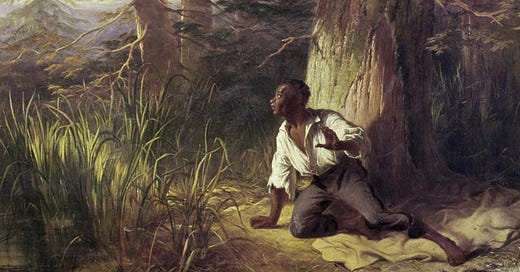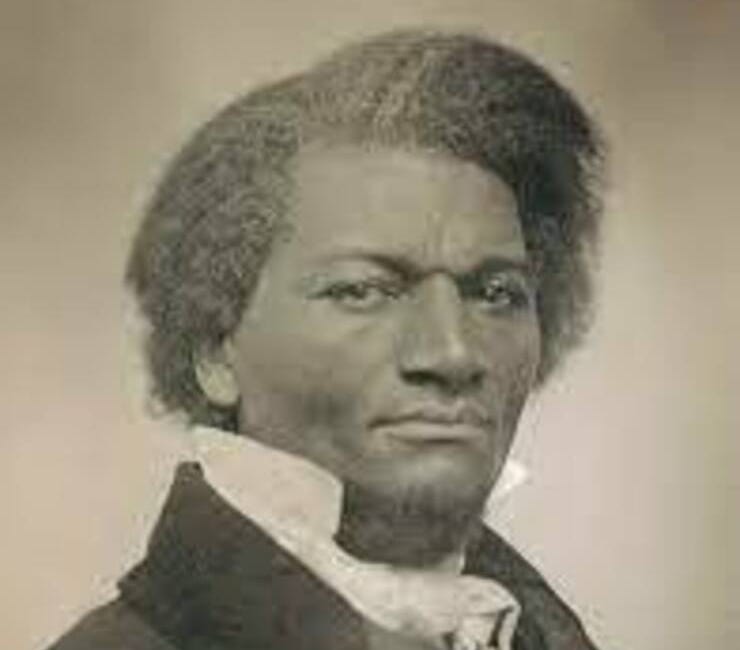Language tricks
Frederick Douglass, Percival Everett, and Branden Jacobs-Jenkins have all radically reimagined how enslaved people in America might have spoken
Frederick Douglass, The Heroic Slave (1853)
The Story so Far: A Northern man travelling through the state of Virginia in 1835 stops in a forest to let his horse drink at a stream, and his attention is caught by the sound of a human voice that seems to be engaged in energetic conversation. He is amazed to discover a Black man talking to himself in a clearing, bitterly bemoaning his enslaved status in which even the animals in the woods around him have more freedom and power than him.
Now Read On…
‘What, then, is life to me? it is aimless and worthless, and worse than worthless. Those birds, perched on yon swinging boughs, in friendly conclave, sounding forth their merry notes in seeming worship of the rising sun, though liable to the sportsman’s fowling-piece, are still my superiors. They live free, though they may die slaves. They fly where they list by day, and retire in freedom at night. But what is freedom to me, or I to it? I am a slave,—born a slave, an abject slave,—even before I made part of this breathing world, the scourge was platted for my back; the fetters were forged for my limbs. How mean a thing am I. That accursed and crawling snake, that miserable reptile, that has just glided into its slimy home, is freer and better off than I. He escaped my blow, and is safe. But here am I, a man,—yes, a man!—with thoughts and wishes, with powers and faculties as far as angel’s flight above that hated reptile,—yet he is my superior, and scorns to own me as his master, or to stop to take my blows. When he saw my uplifted arm, he darted beyond my reach, and turned to give me battle. I dare not do as much as that. I neither run nor fight, but do meanly stand, answering each heavy blow of a cruel master with doleful wails and piteous cries.’
About the author
Frederick Douglass (c. 1817-1895) was a prominent American writer and leading abolitionist best known his autobiography, Narrative of the Life of Frederick Douglass, published in 1845. The Heroic Slave (1853 ) was his only work of fiction and is one of the first examples of African American prose fiction. It is based on the famous Creole mutiny of 1841, the most successful slave rebellion in United States history (two years after the highly publicized Amistad mutiny), and was led by Madison Washington, the man Douglass features as his heroic slave in this remarkable story.
To Read Alongside...
In James, his 2024 award-winning retelling of Mark Twain’s The Adventures of Huckleberry Finn, Percival Everett challenges the stereotype of the poorly-spoken, illiterate slave by having James and his fellow slaves speak perfect English when they talk amongst themselves but then switch to ‘slave language’ when amongst white people. This deft and innovative code-switching is also present in Branden Jacobs-Jenkins’s 2014 play An Octoroon (his adaptation of Dion Boucicault’s 1859 play The Octoroon), in which nineteenth-century enslaved people speak like contemporary New Yorkers.
Like Douglass’s eloquent ‘heroic slave,’ these instances of linguistic inversion empower the characters and energize the stories as well as opening up brilliant new possibilities for retelling—and reclaiming—traditional narratives and ways of thought.
We have also featured Douglass in past newsletters:
A truly scorching Independence Day speech
Frederick Douglass, 'What, to the Slave, is the Fourth of July?'
Frederick Douglass speaks
Frederick Douglass, Narrative of the Life of Frederick Douglass, an American Slave
Suggest a LitHit!
Tell us your own favourites from literature you've read, and we can feature you as a Guest Curator. Just email us with the following information:
Your full name
The title of the book you're suggesting
The location of the excerpt within the book (e.g., "in the middle of chapter 5"), or the excerpt itself copied into the email or attached to it (in Word)
Why you love it, in just a few sentences
**Please note that we welcome all suggestions but at the moment we can only release excerpts that are out of copyright and in the public domain. This means 75 years or more since the author's death. You can find many such out-of-copyright texts on the internet, for example at Project Gutenberg and Standard Ebooks.
About LitHits
You might also enjoy...
Writers Make Worlds: https://writersmakeworlds.com/
The Ten Minute Book Club: https://www.english.ox.ac.uk/ten-minute-book-club
Project Gutenberg: https://www.gutenberg.org/
Standard Ebooks: https://standardebooks.org/
Feedback
We'd love to hear your thoughts on our newsletter:
kshepherdb@yahoo.co.uk
Graphic design by Sara Azmy
All curation content © 2025 LitHits. All rights reserved.





